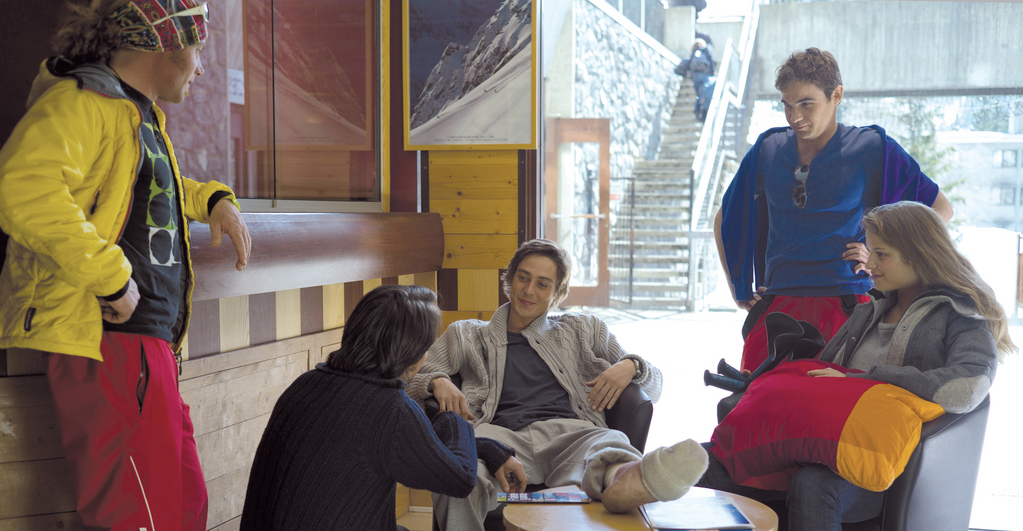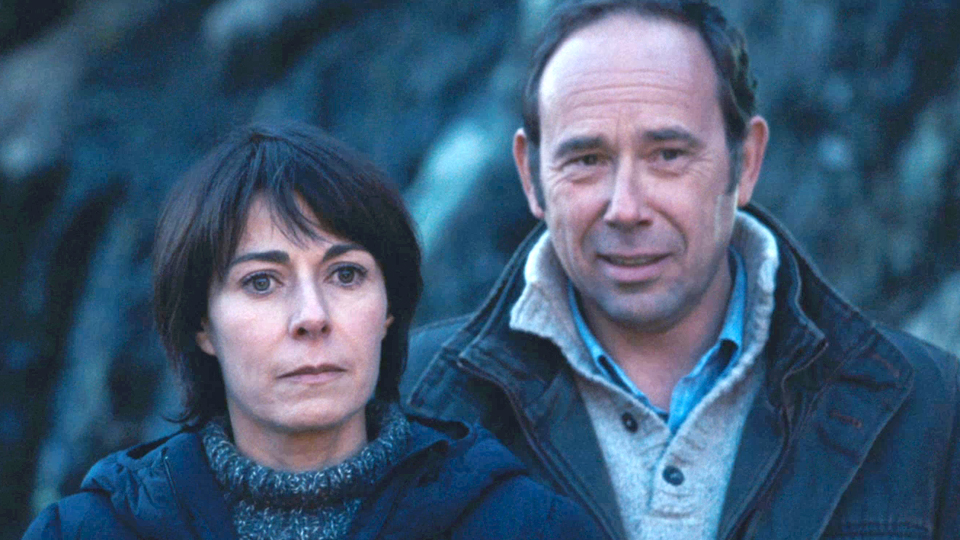by Amy Faulkner
Directed by Marion Hí¤nsel
A pure sheet of pristine white snow spreads itself for miles around, as far as the eye can see. Then two speckled black dots on skis glide into view with a gratifying swooshing sound that echoes pleasantly all around. This is the beautiful, calm, sensuous scene that is the compelling start to Marion Hí¤nsel’s production, Tenderness – and the film ends with a peck on the cheek and an amiable wave. Beginning moves seamlessly to end and the dynamic hardly changes. Yet should we not ask what actually happens in the middle? A truthful answer would of course be, not very much; a short road trip and some bumbling, mildly comedic slip ups (if you can even describe them as that). But the film is about much more than dramatic plot twists. Instead the camera casts a sweeping gaze over the movements of this broken family of three whose separate lives all bind gently together. Anger and bitterness maintain an all-time low in this film. Particularly considering the makeup of Hí¤nsel’s set of characters – divorced couple and son with a soon to be parted with girlfriend – the film exceeds all expectations one might harbour when approaching a film with such a shaky sounding string of relationships.
When son, Jack (Adrien Jolivet), falls and breaks his leg on the ski slope in the French Alps, the drama precipitates the necessary reunion between divorced parents, Lise and Frans (Marilyne Canto and Olivier Gourmet) as they drive to collect him from hospital in the Alps and take him back to his home in Belgium. En route, the divorced couple quickly relapse into the ease between two people who were once clearly very much in love, with none of the awkwardness, nervousness or resentment that you might anticipate. Somewhat surprisingly, the car journey is a complete pleasure. Not for a moment does it drag. The pair tease and mock one another but their jibes never do more than graze the surface. No furious red hot flames of anger to be found. They were left far behind. The mass of snow that carpets the ski resort in Flaine at the beginning defiantly extinguishes any spark that is likely to ignite in the rest of the film.

This is Hí¤nsel’s debut film written and produced entirely alone and it performs marvels. Rather experimental in style, its weak plot is goaded along by promising performances from Marilyne Canto and Olivier Gourmet whose mutual geniality and infantile giggles and smiles evoke whispers of a past love which is now, not stale, but rather simply has faded. The film offers a new perspective on the relationship of post-divorced couples and both Canto and Gourmet relax into their roles with ease. The car journey, the light witty banter followed by jests in good faith and random, unexpected turns in conversation will make us think back fondly on those past days of time spent on long family car rides. The film is accompanied with the repetitive but lovely strums of a guitar piece soundtrack.
Rather mundane scenes pepper the film which are so incredibly insignificant that, at times, they are almost laughable. Although they may prove irritable to some, there is something soothing and warm to seeing Hí¤nsel reveal humanity at its best. Jack’s bedside companion helps him to the toilet with all the kerfuffle of transporting his medical equipment and then, rather humorously, a parallel tricky toilet scene sees Lise get stuck in a compartment.

Essentially, the film is all about how we interact with one another; about mutual respect to those we know and beyond that, extending a kind heart to those we don’t. Strike up a conversation with a little girl in a lift because she is sweet and would like a companion to help her down. Accept that friendly hitchhiker who’s heading your way because you have a space and he has none. Why not? It might be interesting. From an initial presumption that these elements of the film are insignificant and mundane comes the slow and inspiring realisation that these offerings of kindness do not happen every day. In fact, this film is an exposition of the rare subsistence of human grace which we see only once in a while, on the off chance, rather than in the abundance that this film proffers. What utopia we see here where the lid is firmly closed over the pot of simmering anger and rudeness so typical of the human race.
A great and rather unexpected turn in the film is the appearance of a new character as the film steers itself towards the rolling credits. When the rather unnerving face of actor Sergi López looms into view (the renowned villain in films such as Pan’s Labyrinth and Dirty Pretty Things) one cannot help but feel a little nervous, with memories of López’s past appearances. But no fear to be had as this man proves a trustworthy and lovely travelling companion. The note he leaves behind promises new and refreshing offers of love in the future. This confirms what we have already realised. The divorced couple are not going to reignite some passion for one another. Times have changed and their former love has mutated into something different. The film ends and nothing has changed between them. One can only rather wistfully ponder why the hitchhiker failed to leave his number.
Watch Tenderness now over at FilmDoo.com! (UK & Ireland only)





